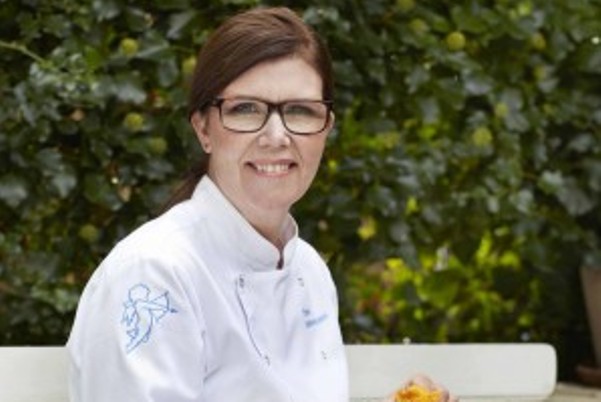
By Trine Hahnemann
Asked to speak on "A prosperous future for all: Gender, climate change and biodiversity in a globalized world," Zester Daily contributor Trine Hahnemann appeared recently on a United Nations panel in New York. The Copenhagen-based chef and caterer, whose clients include the Red Hot Chili Peppers and the Danish House of Parliament, was invited by the Nordic Council of Ministers to participate.
Organizers explained that people assume that women and men are affected by and affect the climate in the same way, but women's and men's lifestyles, behaviors and consumption leave a different environmental footprint. Hahnemann went on to capsulize her perspective in a Q&A format.
How does being a chef and a woman affect your perspective on climate change?
I see the world through food; I have cooked hundreds of thousands of meals in my career. My cooking can only be as diverse and tasty as the produce that the farmers grow. I need diverse products to choose from.
My main focus is on vegetables and grains. I like fish and meat, but not necessarily as the centre of thinking and cooking a meal. I believe we need to change our diet so that 80% of our meals come from vegetables and grains and 20% from animals.
That is a radical change of the diet in many parts of the world, though of course not in India or China, and most parts of Africa. I think we in the Nordic countries should be leading this change, but also show flexibility in its implementation.
We have to change into a more climate-friendly diet: a diet of seasonal vegetables and fruit, more grains, less meat and dairy products. The New Nordic food movement includes ideas to change our daily diet. The new Nordic is in my opinion a frame to understand how this could be a worldwide movement about eating local produce but exchange the ideas globally.
How have our changing, globalizing eating habits affected climate change?
In 2012 in Brazil I met a group of female chefs who wanted to draw attention to organic farming and the use of local produce. One of their focuses was manioc, an indigenous root vegetable, which is not as important in Brazilian food culture as it used to be. It has lost popularity in the competition with wheat. Wheat is not grown in big quantities in Brazil; it is imported.
Brazilians also grow soya and maize, which are exported around the planet to feed cows, even though cows can't really digest corn but should be eating grass, clover and hay. To do this, Brazilian farmers have cut down the rain forest.
This is an example of how we have changed our diet over the last 50 years. Instead of a diet that relied relatively little on protein, most developed countries eat a diet where about 50% of our calories come from protein from animals. This has had a huge impact on the climate. We have contributed to climate change just by the way we eat. About 18% of greenhouse emissions come from livestock. How we eat in the future is very important when it comes to climate change.
For their part, the Brazilian female chefs pledged to use of manioc in meals at all levels, from fine dining to street food to school lunches.
It can be used for many things, including baking, being cracked like bulgur, sauces and as crisp topping on food.
How is this a women's issue?
Men and women work from different perspectives. In many aspects, men are more technical; they invent machines, they look for more technical solutions. They are more competitive and are looking for prestige and position and, therefore, the Michelin star system and acknowledgment like that is often very appealing to men.
Women are the ambassadors for the everyday meal. To change the way we eat we need women to take leadership. They cook public meals, which means they cook in hospitals, kindergartens, schools and elderly homes. Women, for the most part, prepare the daily meals in the households. The famous Michelin male chefs can make the light shine and create focus and attention on important issues, but they cannot make the change; they cook for the rich.
What can communities do to contribute?
One way forward is to create action around the way we eat locally, support organic farming and people who work toward a more holistic solution and look at the land and the people around them.
We need poly-faced farms with sustainable holistic systems where nature, humans and food are at the centre. Biodiversity is life, and maintaining biodiversity is therefore a key to understanding sustainable living on all levels, giving back to nature the same resources we are using, keeping the balance. Women around the world have to be an active part of ensuring that, and it should be a human right, that everybody has a right to decent meal day.
Top photo: Chef and author Trine Hahneman. Credit: Courtesy of Trine Hahnemann
Zester Daily contributor Trine Hahnemann is a Copenhagen-based chef and caterer and the author of six cookbooks. She has catered for artists such as the Red Hot Chili Peppers, Soundgarden, Elton John, Pink Floyd, Tina Turner and the Rolling Stones. Her company, Hahnemann's Køkken counts the Danish House of Parliament among its clients.
More from Zester Daily: